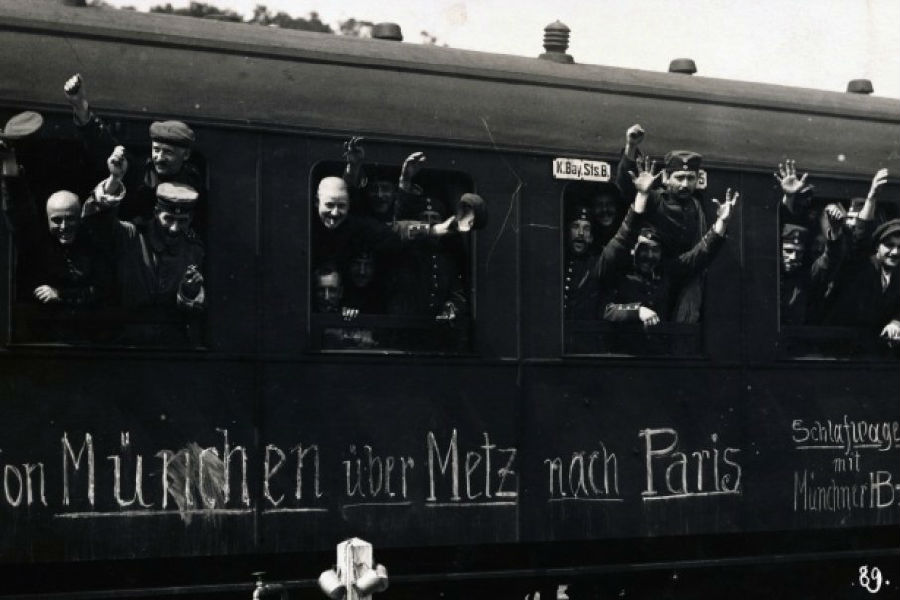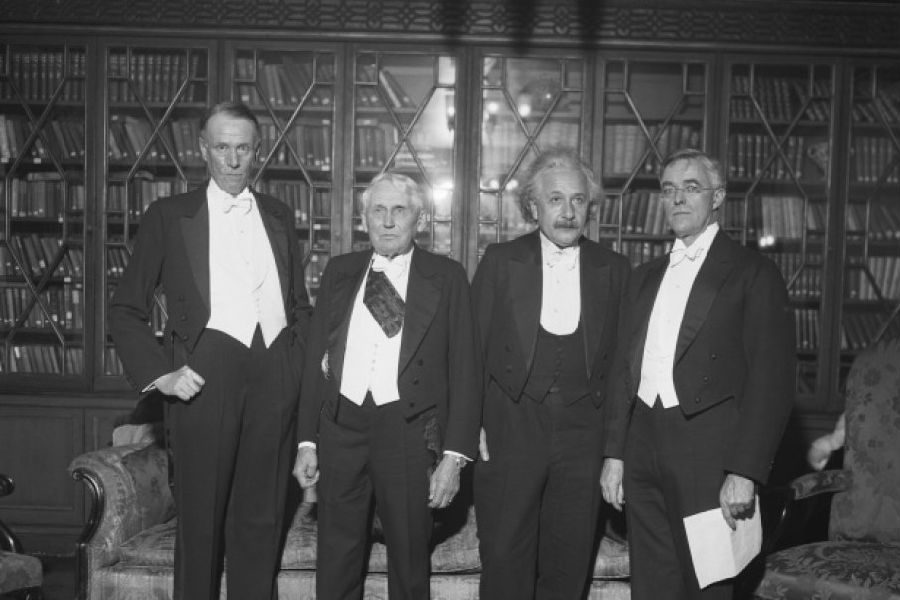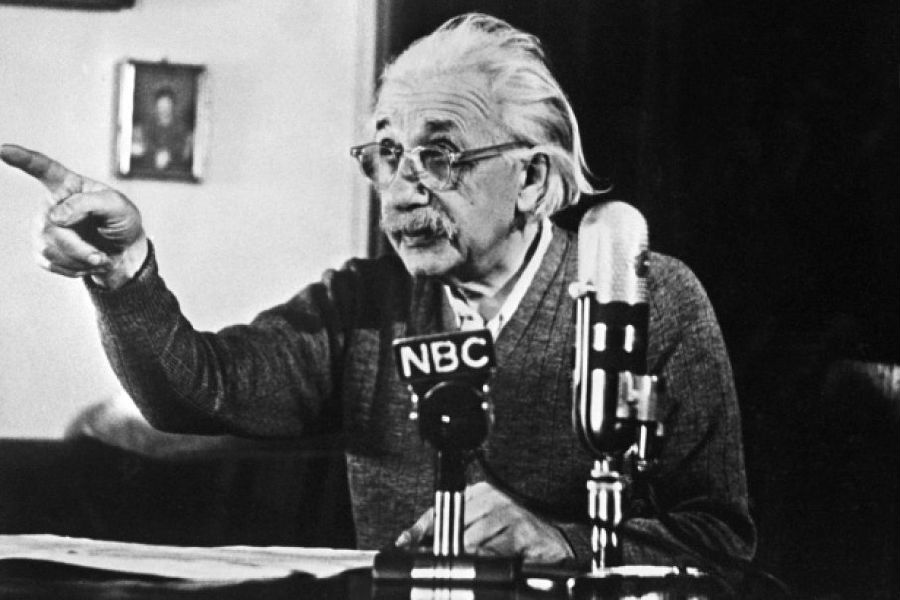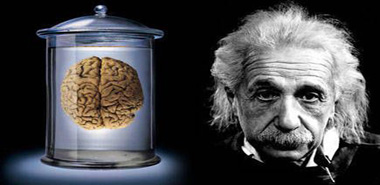5.He Mediated a Hostage Negotiation
5.他曾在人质谈判中担当调解人
Einstein was willing to put his pacifism and commitment to peace into action, even at the risk of his own hide. In 1914, he and three colleagues in Germany singled themselves out by daring to sign a statement protesting the then-empire's militarism and involvement in World War I. The four issued the declaration in reply to the "Manifesto to the Civilized World," a government-sponsored document that defended Germany's invasion of neutral Belgium and which nearly 100 eminent German intellectuals signed. While many of his colleagues offered the fruits of their genius to the war effort, Einstein refused.
爱因斯坦是一个和平主义者,为了和平他甚至以身犯险。1914年,他和三位同事在德国大胆签署反战声明,反对军国主义,反对德国参与第一次世界大战。他们四人签署反战声明是为了表明立场,反对由德国政府发起的“文明世界的宣言”——该声明是德国为了侵略中立国比利时而进行的自我辩护,将近100位杰出的德国知识分子在上面签了字。虽然他的很多同事都将自己的科学研究成果贡献给了战争,但是爱因斯坦拒绝参与其中。

The war left Germany devastated, deeply in debt and facing social upheaval. During the turmoil that followed, radical students at the University of Berlin took the rector and several professors hostage, and no one wanted to take their chances finding out how the police would resolve the standoff. Both students and professors respected Einstein, so he and Max Born, a German-born pioneer of quantum mechanics, found themselves in a position to defuse the situation, which they did. In later years, Einstein would recall with amused wonder how naïve they had been for never considering that the students might have turned on them.
战争让德国变得满目疮痍,负债累累,社会动荡不安。在后来的一次动乱中,几个思想激进的柏林大学学生把校长和几位教授挟持为人质,警察却用一个出乎意料的办法打破了僵局。由于爱因斯坦受到双方尊敬,因此他与量子力学奠基人,德国物理学家马克斯·玻恩一同出面平息了这次事件。多年之后,爱因斯坦仍然饶有兴趣地回忆这件事,他们从没想到会受到学生的攻击,实在太天真了。
4.He Didn't Win the Nobel Prize for Relativity
4.相对论没有让他获得诺贝尔奖

As with most scientific revolutions, Einstein's breakthrough insights on special relativity in 1905 did not arise out of a vacuum. His genius lay in how he transformed previous work by scientists like Henri Poincaré and Hendrik Lorentz into a new, unified theory, one that removed the friction between Newtonian physics and James Clerk Maxwell's theory of light.
正如大多数科技革命一样,爱因斯坦在1905年创立狭义相对论,尽管在物理学研究上取得突破性进展,却并没有停滞不前。他把亨利·庞加莱和亨得里克·洛伦兹等前辈的研究成果发展成新的、统一的理论,这正是他的天才之处。他解决了牛顿力学与詹姆斯·克拉克·麦克斯韦提出的光学理论相冲突的问题。
Published in 1916, Einstein's theory of general relativity completed special relativity by bringing gravity and acceleration into the picture through the concept of warped space-time. Unfortunately, it took years to prove one of its key predictions, the lensing effect of gravity. When astronomers finally confirmed the bending of starlight during observations of a 1919 solar eclipse, it launched Einstein into overnight celebrity, but three more years would pass before the Nobel committee retroactively awarded him the 1921 Nobel Prize in physics in 1922. Einstein received the prize for "the discovery of the law of the photoelectric effect." The photoelectric effect refers to the release of electrically charged particles (ions or electrons) from (or within) a material that absorbs electromagnetic radiation (such as light). Einstein's crucial work in this area resolved perplexing questions regarding the particle-wave duality of light. Nevertheless, Einstein's acceptance speech focused on his work in general relativity, a problem that had occupied him for nearly a decade, and whose importance would not be fully appreciated for decades to come.
1916年,爱因斯坦把重力和加速度带入弯曲时空中,创立并发表了广义相对论。遗憾的是,重力透镜效应,这一关键性假设在多年后才得以证实。1919年,天文学家通过一次日食观察,终于证实星光会受重力影响而弯曲,该发现让爱因斯坦一夜成名。然而,又过了三年多,在1922年,诺贝尔奖委员会才授予爱因斯坦1921年诺贝尔物理学奖。爱因斯坦因发现光电效应而获得诺贝尔奖。光电效应是指在电磁波(例如光)照射下,某物质(或内部)会发射出带电粒子(离子或电子)的物理效应。爱因斯坦在该领域的重大发现,解决了与光的波粒二象性有关的复杂问题。然而,爱因斯坦在发表获奖感言时,始终在讲有关广义相对论的研究工作,他用了将近十年才解开这项难题,可是在今后的几十年里,人们可能都无法充分认识到它的重要性。
3.He Co-invented a Refrigerator
3.他与别人合作发明了一种冰箱

Between gas in the pipes and arsenic in the paint and wallpaper, households in the 1920s packed more than their share of deadly substances. Thus it seems appropriate that the transition from the traditional icebox (literally, an insulated wooden box with ice in it) to electrical refrigerators added to the peril by occasionally leaking volatile chemical coolants like methyl chloride, ammonia or sulfur dioxide to poison hapless homeowners.
20世纪20年代,家家户户都存在很多安全隐患,比如各种管道里的气体、油漆和壁纸中所含的有毒物质——砷。由于电冰箱代替了传统冰箱(从字面可以看出,传统冰箱是一个里面放有冰块的,能够隔热的箱子),因此发生危险的可能性也随之增加。偶尔有制冷剂(氯甲烷、氨气或二氧化硫)泄露这样的意外发生,导致有人不幸中毒。
One such incident in 1926 inspired Einstein to enlist the help of Hungarian physicist Léo Szilàrd in designing a new kind of appliance called an absorption refrigerator that required only ammonia, butane and water, plus a heat source for the pump. Patented in 1930, their device relied on the principle that liquids boil at lower temperatures when exposed to lower atmospheric pressures. As pressure in the pipe above the butane reservoir dropped, the butane would boil off, drawing in heat from its surroundings and lowering temperatures in the fridge. Because it had no moving parts, the appliance would last as long as its casing. Einstein and Szilàrd's refrigerator lost out to more efficient competitors and to the introduction of chlorofluorocarbons, which replaced more hazardous coolants and rendered the compressor fridge safer for people, if not the ozone layer. But new technologies and growing environmental concerns have today sparked renewed interest in their approach, particularly as a means of providing refrigeration in remote and rugged areas.
1926年发生了一起制冷剂中毒事件,这件事促使爱因斯坦产生研制新型冰箱的想法。在匈牙利物理学家莱奥·西拉德的帮助下,爱因斯坦发明了一种吸收式冰箱,这种冰箱只需要氨、丁烷和水,外加一个热源作为动力就可以运行。他们在1930年申请了专利,它的工作原理是:液体在低气压环境下可以低温沸腾。随着管中压力增加,丁烷容器中压力迅速降低,丁烷在低压环境下发生汽化,从而吸收周围的热量降低冰箱内温度。由于该装置没有运动部件,因此它的使用寿命和外壳一样长久。爱因斯坦和西拉德发明的冰箱很快被市场淘汰,一种新型冰箱——压缩机冰箱问世,这种冰箱用氯氟烃代替旧的制冷剂,提高了冰箱的安全性,但是存在一个致命的缺点——氯氟烃会破坏臭氧层。然而随着新技术不断涌现,加上人们越来越重视环保,爱因斯坦发明的冰箱再次受到关注,这种冰箱特别适合偏远地区。
2.He Was Offered the Presidency of Israel
2.他差点成为以色列总统

Although Einstein made his mark primarily as a physicist, his political views have grown nearly as famous as his scientific achievements. But they were also more complex than many realize.
尽管爱因斯坦是一位著名的物理学家,但是他的政治观点和他取得的科学成就一样出名,甚至比我们想象中的更为复杂。
Einstein was a lifelong pacifist, except when it came to taking up defensive arms against the Nazis, who singled him out for persecution. Moreover, when he realized that scientists in Nazi Germany might be working on nuclear chain reactions with bomb potential, he wrote a letter to President Roosevelt urging that the U.S. government coordinate its own research in the area. The letter may have contributed to the formation of the Manhattan Project, to which Einstein -- much to his relief -- was not invited; the government considered him a security risk due to his many associations with peace causes and memberships in social advocacy groups like the NAACP. Nevertheless, his E = mc2 equation was essential to their successful efforts in making the first atomic bombs. Einstein also helped fund the war effort by auctioning his manuscripts, and worked after the war to oppose the development of the hydrogen bomb and to control nuclear proliferation. In 1952, Israeli premier David Ben-Gurion offered Einstein the presidency of the newly established state of Israel. Einstein politely turned him down, citing advancing age and stating that his lifelong focus on objective matters had left him unsuited to politics.
爱因斯坦一生坚持和平主义的立场,只有在遭到纳粹迫害时,才拿起武器捍卫自己的权力。爱因斯坦发现纳粹德国的科学家可能在研制核武器,他立即给美国总统罗斯福写信,说服美国政府进行相关领域的研究。这封信成为曼哈顿计划形成的助推剂,不过,因为政府考虑到他与“全国有色人种协进会”这种主张和平的社会团体有着密切联系,所以爱因斯坦并没有受到该计划邀请,这一点让他十分欣慰。尽管爱因斯坦没有参加,但是在第一颗原子弹研制成功的过程中,他推导出来的方程式:E=mc²起到了关键作用。爱因斯坦还通过拍卖手稿来资助抗战,等战争结束后,他依然坚持和平主义立场,反对研发氢弹,支持控制核扩散。1952年,以色列总理戴维·本-古里安正式提请爱因斯坦为以色列共和国总统候选人。爱因斯坦婉拒了他的请求,称自己年事已高,一生从事科学研究早已无心从政。
1.His Brain and Eyes Were Stolen
1.有人偷走了他的大脑和眼睛

Einstein intended that his body be cremated and his ashes scattered secretly, so as to avoid the possibility of admirers making a shrine of his grave. But when pathologist Dr. Thomas Harvey walked into the Princeton morgue on April 18, 1955, all of that went out the window. Presented with the opportunity to study the brain of one of the great geniuses of the age, and without permission, authority or experience as a neuroscientist, he absconded with 2.7 pounds (1.2 kilograms) of Einstein's gray matter. He also removed the deceased physicist's eyeballs and gave them to Einstein's eye doctor, Henry Adams. They remain in a New York City safe deposit box to this day.
爱因斯坦打算死后火化,并将骨灰洒在秘密的地方,以避免仰慕者到他的墓地朝拜。但是,1955年4月18日,病理学家托马斯·哈维走进普林斯顿大学医院的停尸间,爱因斯坦的这一愿望便落空了。为了研究这位伟大天才的大脑,他擅自偷走了爱因斯坦重达2.7磅(1.2公斤)的脑灰质。他还拿走了爱因斯坦的眼球,把它们交给爱因斯坦的眼科医生——亨利·亚当斯。直到今天,这双眼球仍然保存在纽约市一家银行的保险箱里。
A tragicomic series of road trips ensued, with Harvey storing slices and chunks of the brain in jars, first in his basement, then in a cider box squirreled away beneath a beer cooler as he relocated after losing his medical license, then in the backseat of a reporter's car. He apparently intended to study the brain and determine what made it so smart, but in 43 years he never got around to it, perhaps because he moved around so much or because lacked the expertise and funding. Ultimately, he returned most of the brain to Princeton, bringing the physicist's postmortem peregrination full circle.
接下来发生了一连串的事,真是让人哭笑不得。最初,哈维把大脑切开,装进广口瓶中,放在他的地下室;被吊销行医执照后,他又把大脑装进苹果酒盒里,放在啤酒冷藏器的下面;再后来又藏在汽车后座。很显然,他想找出爱因斯坦聪明过人的原因,可是在43年里,他一直没能实现这个愿望。也许因为他居无定所,也许因为他缺乏专业知识和资金。最终,他带着爱因斯坦的大脑进行了一次横贯美国之旅。然后,他把大脑还给了普林斯顿大学医院。

















